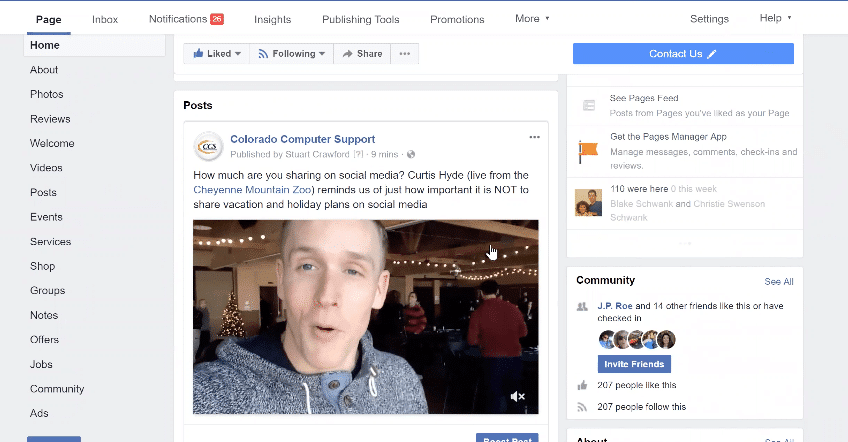Co-marketing is about sharing audiences and resources between two brands to execute a campaign that neither one could do as effectively alone.
Why did they want to do this? Because their video also went out to all the people who regularly "like" The Zoo - 123,000 people!
CCS took this one step farther and recorded their weekly "Tuesday Tech Tip" video while at the party. Everyone who "liked" The Zoo's Facebook page got a chance to watch this short video and learn about the services that Colorado Computer Support provides.

You can do this, too:
- Plan ahead and prepare a script that will resonate with your audience;
- Go to a popular restaurant or venue in your local area;
- Get their permission to take a video of you talking; and
- Turn on your smartphone and start recording.
When you post your video on your Facebook page, be sure to tag the location, and you'll reach so many more viewers than you would have on your own.
So easy!
Co-Marketing Must Be a Win-Win Opportunity
Entering into a co-marketing agreement must benefit both you and your marketing partner, and it must be in a proportional way. When approaching another business with your idea, make sure you know what's in it for them, as well as you.
This (of course) won't work with your competitors; it’s only for businesses that complement yours in some way. When the exchange is equitable, co-marketing is a great way to reach new audiences and drive down the costs of marketing. Doing so will help you take advantage of the reputation of another business or brand while also giving them exposure to your clients and prospects.
You Must First Know Your Audience
To ensure you benefit from a co-marketing agreement and the time you invest in it, you must know your target audience. To position your MSP in front of a targeted buyer, highlight their features and ensure they match the customers your co-marketing partner serves.
When identifying your ideal prospect, don’t neglect passive buyers - those who may not need your services, but know someone who does. For example, the people who frequent the Italian restaurant in town might not own a business, but they know someone who does. Think outside the box. They may not be the "hot" leads you want, but "warm" ones who can refer you to the "hot" ones down the line.
Your Co-Marketing Partner Must:
- Have a good reputation in the community.
- Serve customers who need IT service and support (or know someone who does).
- Offer something that will appeal to your customers/prospects.
- Have the organic reach to make this worth your effort.
- Know who their target buyer is. Will your clients be interested in their services/products? Remember, this must be a Win-Win proposition.
A Few Tips:
- Share each other's blogs, Facebook pages, YouTube channels, podcasts, Snapchat accounts and email lists.
- Share the emails you capture from a campaign that you both contribute resources to execute.
- Showcase your partner's brand to your customers in exchange for getting some time in front of theirs.
- Get your marketing materials into the hands of their qualified buyers in exchange for doing the same for them.
- Offer their customers something that has a high value to them (real or perceived) that won’t break your budget - perhaps a free eBook about cybersecurity.
- Make sure that your offer is so attractive that their buyers will think more highly of them for introducing you (and vice versa).
- The "bait" for your campaign must be clear, enticing, and centered around the needs of your audiences.
What Does Success/Failure Look Like?
Before you begin, agree upon your expectations. If you don't, one of you will certainly go away with hard feelings. You can redefine this along the way.
Most co-marketing campaigns take time to get right. You may not generate the results you're looking for from the start. Evaluate your success and your failures. Act on the insights you gain and adapt accordingly.
You can re-target your approaches part-way through the campaign. Remember that you are partners. You'll need to compromise at some point.
Another important part of your co-marketing campaign is the ability to deliver what you promise. If one of you can’t deliver, this is not only frustrating but possibly damaging to the reputation of your businesses.
Evaluate
Remember to evaluate your success (or failure). If things go so wrong that you can't recover, or you aren't getting the ROI you need from the co-marketing partnership, start looking for another co-marketing partner.
Ulistic has the co-marketing expertise your MSP needs to succeed. Contact us for a consultation before you set out to do this yourself. {phone} or info@ulistic.com.



